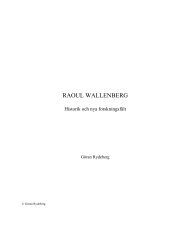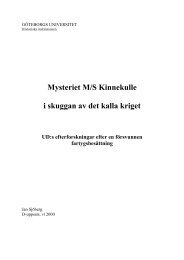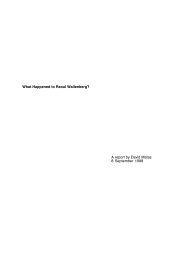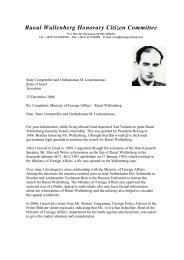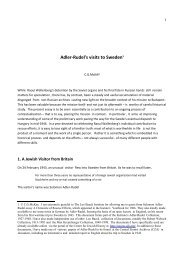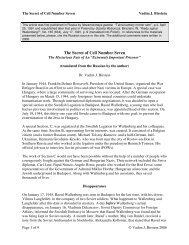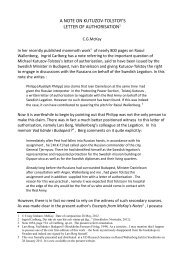raoul wallenberg swedish humint actions during ww2 - Searching for ...
raoul wallenberg swedish humint actions during ww2 - Searching for ...
raoul wallenberg swedish humint actions during ww2 - Searching for ...
You also want an ePaper? Increase the reach of your titles
YUMPU automatically turns print PDFs into web optimized ePapers that Google loves.
Raoul Wallenberg and Swedish HUMINT <strong>actions</strong> <strong>during</strong> WW2<br />
Introduction<br />
The purpose of this paper is threefold. First, it is the intention here to explain some of the<br />
Swedish HUMINT activities <strong>during</strong> WW2 and especially those related to Hungary. This first<br />
section will also include a short discussion of some aspects of Sweden’s engagement in the<br />
peace talks between Germany and its opponents.<br />
Second, an attempt will be made to investigate whether these activities on Sweden’s part may<br />
have affected the fate of the diplomat Raoul Wallenberg in any way or whether he may<br />
perhaps, directly or indirectly, have participated in any HUMINT operations. In order to<br />
obtain a more detailed picture of his <strong>actions</strong>, some departures are made from the original<br />
intention to concentrate only on facts that could be considered to relate to his mission in<br />
Hungary <strong>during</strong> 1944-45. The reason is the presumption that his activities be<strong>for</strong>e that period<br />
may have been of crucial importance to his destiny.<br />
The third and final aim is to find out how the Soviet authorities interpreted known or<br />
presumed Swedish HUMINT activities and the supposed role of Raoul Wallenberg in them.<br />
Did the Soviet Union have in<strong>for</strong>mation that it expected to show that the Swedish diplomat had<br />
been involved in open or clandestine activities contrary to the interests of Moscow?<br />
The Swedish HUMINT Organisation and Hungary<br />
The tragic fate of the Swedish businessman and diplomat Raoul Wallenberg, who was<br />
arrested by units from the Red Army in Budapest in January 1945 and then “disappeared”,<br />
will never be <strong>for</strong>gotten. Thousands of books, articles and other papers have since been<br />
produced, but nobody has yet been able to reveal the truth of what really happened. /This article<br />
is an abridged version of Göran Rydeberg, Raoul Wallenberg. Historik och nya <strong>for</strong>skningsfält (Stockholm 2002)<br />
and Raoul Wallenberg. Ett öde (Stockholm 2004; unpublished book). Cf. UD II 52 and SOU 2003:18. Ett<br />
diplomatiskt misslyckande. Fallet Raoul Wallenberg och den svenska utrikesledningen./<br />
The purpose of this paper is not to help answer the crucial question of what really happened to<br />
Wallenberg, but rather to provide a short summary of what we know about his possible<br />
connections with intelligence organisations and activities. Be<strong>for</strong>e starting the investigation it<br />
is vital to emphasise that many questions and gaps in our knowledge still remain.<br />
Is it really of any importance to ascertain whether the lost diplomat had any contacts with<br />
Swedish or international intelligence organisations? The answer is definitely yes. We can<br />
assume that both the Germans and their allies and the Western powers and Soviet Union<br />
carefully scrutinised the activities of representatives of neutral countries in Central Europe<br />
<strong>during</strong> WW2. Sweden, together with e.g. Switzerland, served as a protecting power to the<br />
enemies of the Axis powers in countries like Hungary, which though <strong>for</strong>mally non-aligned<br />
was almost totally dependent on Germany. By so doing, these countries drew far more<br />
attention to themselves than could have been expected under more normal conditions. This in<br />
turn meant that representatives of Sweden, Switzerland, Spain and others in such countries as<br />
Hungary were at real risk.<br />
In this respect the situation <strong>for</strong> Sweden was especially difficult in terms of its relations with<br />
the Soviet Union. From June 1941 there existed a commitment on Stockholm’s part to act as a<br />
protecting power <strong>for</strong> its great easterly neighbour. Several times over the years, Moscow <strong>for</strong><br />
various reasons showed displeasure with Sweden, accusing it of being too indulgent in its<br />
attitude to Germany.<br />
The Western allies also made frequent acid remarks about the attitude of Sweden <strong>during</strong> the<br />
war, at least until 1944 when Stockholm finally dared in view of the state of the war to stand<br />
2




